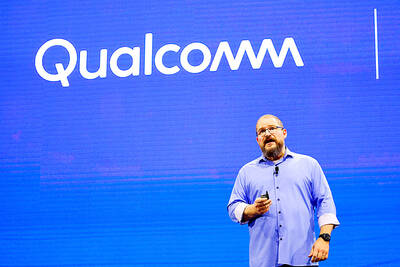Taiwan Financial Holding Co (台灣金控) chairman Tsai Jer-shyong (蔡哲雄) said yesterday that his company would seek to go global by forging strategic alliances with foreign financial institutions or through buying them outright.
Taiwan Financial Holding, the largest financial institution in Taiwan, has also committed to "serving Taiwanese businesspeople worldwide, wherever they are," said Tsai, who arrived in Singapore on Sunday with several executives on a fact-finding tour.
TALKS
Tsai said his firm was in talks with several leading financial institutions over the feasibility of jointly offering mutual funds on international fund markets.
He declined to disclose the foreign financial institutions in talks with Taiwan Financial Holding.
The head of Taiwan Financial Holding said that in addition to speeding up its globalization strategy, the company would make "serving Taiwanese businesspeople overseas" one of its top business priorities.
EXPATRIATES
Taiwan Financial Holding, which was inaugurated in Taipei on Jan. 1, will offer overseas Taiwanese businesspeople diverse financial services, including stocks and securities, insurance, mutual funds and personal financial management.
Tsai and his group were scheduled to depart for Thailand last night to continue their Asian business trip, which will also take them to Hong Kong.
MAJOR LEAGUE
Taiwan Financial Holding was formed through a merger of the Bank of Taiwan (
With about NT$5.12 trillion (US$157.83 billion) in assets, NT$3.88 trillion in deposits and NT$3.24 trillion in active loans, Taiwan Financial Holding has an 18 percent share of the domestic market.
It is not only Taiwan's largest financial institution but also the nation's first holding company to rank among the world's top 100, placing No. 18 among Asian banks and No. 89 globally.

Intel Corp yesterday reinforced its determination to strengthen its partnerships with Taiwan’s ecosystem partners including original-electronic-manufacturing (OEM) companies such as Hon Hai Precision Industry Co (鴻海精密) and chipmaker United Microelectronics Corp (UMC, 聯電). “Tonight marks a new beginning. We renew our new partnership with Taiwan ecosystem,” Intel new chief executive officer Tan Lip-bu (陳立武) said at a dinner with representatives from the company’s local partners, celebrating the 40th anniversary of the US chip giant’s presence in Taiwan. Tan took the reins at Intel six weeks ago aiming to reform the chipmaker and revive its past glory. This is the first time Tan

Qualcomm Inc is strengthening its partnerships with Taiwan Semiconductor Manufacturing Co (TSMC, 台積電) and original design manufacturers (ODMs) in Taiwan as it expands its presence in the artificial intelligence (AI) computer market, CEO Cristiano Amon said in Taipei yesterday ahead of the annual Computex trade show. “Historically we’ve always been a very big customer of TSMC, and we continue to be,” Amon said during a media Q&A session. “For chip manufacturing, we’re among the largest fabless [semiconductor designers],” he said, noting that Qualcomm, a leading provider of mobile and AI-enabled chipsets, ships about 40 billion components every year, with TSMC being

‘FAILED EXPORT CONTROLS’: Jensen Huang said that Washington should maximize the speed of AI diffusion, because not doing so would give competitors an advantage Nvidia Corp cofounder and chief executive officer Jensen Huang (黃仁勳) yesterday criticized the US government’s restrictions on exports of artificial intelligence (AI) chips to China, saying that the policy was a failure and would only spur China to accelerate AI development. The export controls gave China the spirit, motivation and government support to accelerate AI development, Huang told reporters at the Computex trade show in Taipei. The competition in China is already intense, given its strong software capabilities, extensive technology ecosystems and work efficiency, he said. “All in all, the export controls were a failure. The facts would suggest it,” he said. “The US

NEW PRODUCTS: MediaTek has been diversifying its product lines to minimize operational risks as mobile chips remain the company’s biggest revenue source MediaTek Inc (聯發科), the world’s biggest supplier of smartphone chips, yesterday said the tape-out process for its first 2-nanometer chip would take place in September, paving the way for volume production of its most advanced chip, likely to be its next-generation flagship smartphone chip, around the year-end at the earliest. MediaTek has been leveraging advanced process technologies from its foundry partner, Taiwan Semiconductor Manufacturing Co (TSMC, 台積電), to build its flagship mobile phone chips, a segment it once relinquished and then recovered four years ago as it released its Dimensity series. In the semiconductor industry, a tape-out refers to the